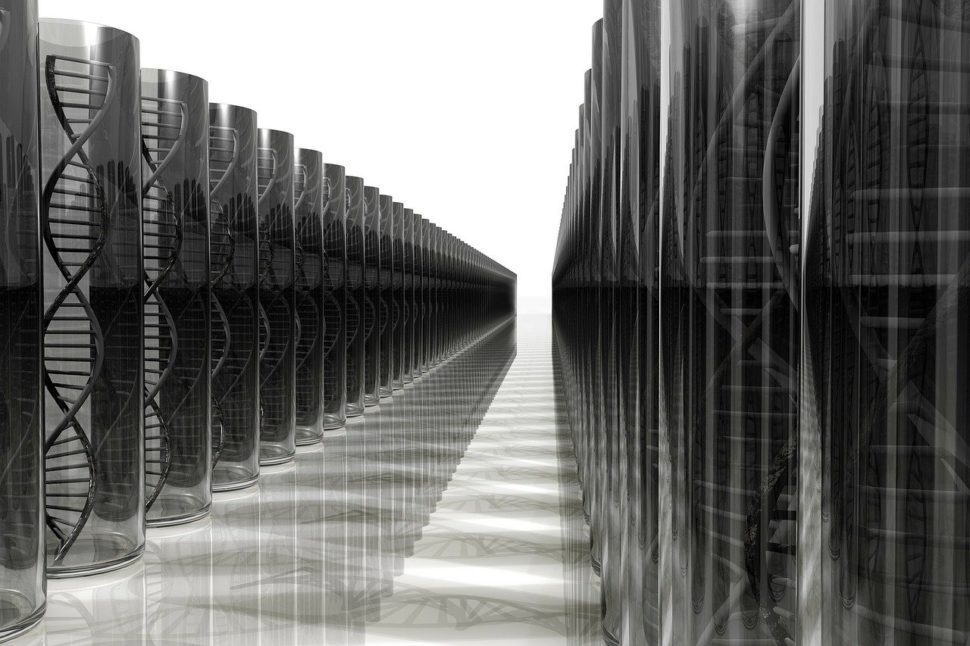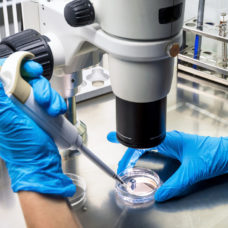The idea of storing data in DNA is not new.
It begins with researchers converting a data file — represented by binary numbers — into a combination of the molecule‘s four bases. These include adenine, guanine, cytosine, and thymine.
After that, they can write that code into DNA using a DNA synthesizer.
Unfortunately, that’s not nearly as simple as it sounds. That’s because the DNA synthesis’s accuracy decreases as the code gets longer. As a workaround, researchers usually have to break their files down into chunks.
Then, they would write those chunks into snippets of DNA between 200 and 300 bases long. DNA sequencers could eventually reassemble the snippets again to access the data.
As you can imagine, the technology is quite expensive.
For example, it could cost as much as $3,500 to synthesize one megabit of information. Moreover, the vials of DNA in which the researchers stored data can still degrade over time.
A team led by Harris Wang of Colombia University devised a way to tackle this issue.
In their published paper in the journal Nature, the team wrote:
“This work establishes a direct digital-to-biological data storage framework and advances our capacity for information exchange between silicon- and carbon-based entities.”
Here’s the breakdown of the study.
Storing Data in the DNA of Living Bacteria
Wang and his team figured out a way to use the same method with living organisms. That way, the data can last much longer. Also, organisms can pass it down to their offspring.
Using CRISPR, the team managed to electrically encode 72 bits of data to write the words “Hello world!” into a population of bacterial cells.
There are several benefits to using the DNA as data storage.
For one, it’s over a thousand times as dense as the most compact hard drives. As a result, the DNA can store an equivalent of 10-full length movies within the volume of a single grain of salt.
Besides, DNA is central to biology. So, the technology to read and write data on it should become more accessible and powerful.
With that said, we’re still a long way from storing data in the DNA of living cells.
As impressive as the feat may seem, 72 bits is not a lot of data. As such, it’s unlikely that we’ll be storing and retrieving data from living cells in the next couple of years.
“We’re not going to compete with the current memory storage systems,” Wang said.



















HOW I RECOVER MY LOST BTC WALLET THROUGH OMEGA CRYPTO RECOVERY SPECIALIST
I am by name Dung Hung from Ho Chi Minh City, Vietnam. Losing a BTC wallet can be a nightmare for anyone who has invested a lot in cryptocurrency. Unfortunately, I found myself in this exact situation a few days ago when I realized that I had lost my BTC wallet. The panic and anxiety that came with losing something so valuable were overwhelming, and I was desperate to find a solution. After extensive research, I finally decided to reach out to OMEGA CRYPTO RECOVERY SPECIALIST, a recovery service that helped me recover my lost BTC wallet. I am a living testifier and I am putting this out here to anyone who also requires their service. They are fast and reliable
Contact Line;
www . omegarecoveryspecialist . c o m
+1 (251), 2 16. 64 6 6
Mail; support@omegarecoveryspecialist . c o m
My Review: How to Recover Your Lost or Stolen Bitcoins – iBolt Cyber Hacker
iBolt Cyber Hacker offers solutions to help regain control of digital assets, Whether your bitcoins were stolen through hacking, lost due to forgotten keys, or inaccessible for any other reason, iBolt Cyber Hacker has the experence to help you. Their team use advanced blockchain technology with sophisticated cybersecurity techniques to navigate the complexities of cryptocurrency recovery.
I Truly Recommend Them
More Info:
Email: Support @ iboltcyberhack . com
Contact/Whatsapp: +39 350 929 0318
Website: https : // iboltcyberhack . com /
Hire iBolt Cyber Hacker to recover your cryptocurrency from fraudulent investments.
I’d like to tell how I lost my funds after investing with a scam crypto trading platform, I finally located a legitimate Crypto Recovery team iBolt Cyber Hacker, I had previously seen many testimonies about them, but I never imagined I’d need their services until I became a victim of a cryptocurrency investment fraud offered to me by someone I met online. I was upset and the first thing I did was call the police, but nothing was done. My last option was to use iBolt Cyber Hacker. I gave the scammers details and screenshots of the transactions I performed, and they used these to trace my funds and recovered everything, My greatest gratitude goes to iBolt Cyber Hacker Please i urge everyone to be extremely careful.
More Info:
Email: Support @ iboltcyberhack . com
Contact/Whatsapp: +39 350 929 0318
Website: https : // iboltcyberhack . com /
Hello everyone, my name is Frank Lewis from Boston. I was among those who invested a good amount of money and time into crypto trading and ended up losing it all to a fake crypto scam. I was in huge debt and was going into depression until I came across a page pouring out praises about a Crypto recovery company FIRMWALL CYBER SECURITY COMPANY. At first, I was not fully convinced about their service but after losing more than a million dollars to a crypto scam, I decided to give it a try and see how it went, and to my biggest surprise, FIRMWALL CYBER SECURITY SERVICE was able to recover the crypto funds that was stolen from me. Truly, I’m still in shock about it because I thought I had lost it all. I’m very happy to know there is such a company out there to help scam victims recover their funds. I highly recommend their service to everyone out there who needs the same service.
Their Contact Information: FIRMWALLCYBER@TECHIE . COM
FIRMWALLCYBER.WIXSITE.COM/FIRMWALL
WHATS APP + 1 937 542 066 7